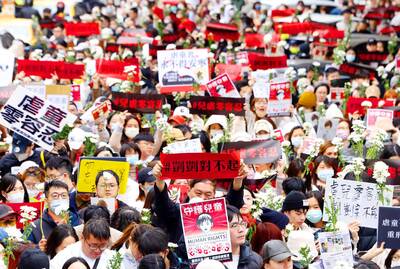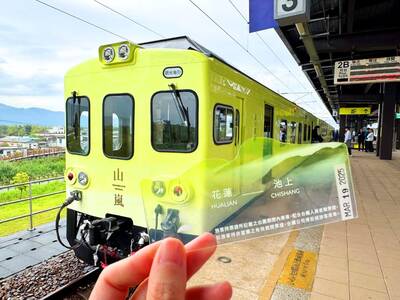Former premier Frank Hsieh (謝長廷) yesterday countered President Ma Ying-jeou’s (馬英九) interpretation of his “constitutions with different interpretations” (憲法各表) proposal, saying the initiative was intended to highlight that there were two constitutions on either side of the Taiwan Strait, not one.
Ma was quoted in an interview with Chinese-language news magazine Yazhou Zoukan published on Thursday as saying that Hsieh’s initiative “is not different than the Chinese Nationalist Party’s [KMT] initiative of ‘one China with different interpretations’ (一中各表).”
“Hsieh advocated ‘constitutional one China’ (憲法一中) in the past and is now advocating ‘constitutions with different interpretations.’ Putting them together, you get ‘one China with different interpretations.’ It’s the same as our initiative,” Ma said.
In response, Hsieh said in Yilan County that his initiative “highlights the fact that there are two effective and working constitutions in Taiwan and China at present, while there would be only one legal constitution in the KMT’s initiative.”
“Our Constitution has gone through amendments and the democratic reform in Taiwan that would reaffirm the existence of the Republic of China [ROC]. It is different from the ‘one China’ initiative,” Hsieh added.
Beijing has never accepted the KMT’s “one China with different interpretations” initiative and has always spoken against it publicly, Hsieh said.
The former premier said it would be better for Taiwan if the DPP and the KMT had similar cross-strait policies and positions so the parties would be able to compete on their domestic policies and governance and the nation would have normal party politics.
However, former vice president Annette Lu (呂秀蓮) agreed with Ma’s assessment, saying yesterday in New Taipei City (新北市), where she was campaigning for an anti-nuclear power referendum, that “Ma has hit the bullseye and everyone knows it.”
Hsieh is free to say what he wants, but if even Ma could see through Hsieh’s proposal, the DPP should try to clarify its China policy and position as soon as possible, Lu said.

Taiwan yesterday condemned the recent increase in Chinese coast guard-escorted fishing vessels operating illegally in waters around the Pratas Islands (Dongsha Islands, 東沙群島) in the South China Sea. Unusually large groupings of Chinese fishing vessels began to appear around the islands on Feb. 15, when at least six motherships and 29 smaller boats were sighted, the Coast Guard Administration (CGA) said in a news release. While CGA vessels were dispatched to expel the Chinese boats, Chinese coast guard ships trespassed into Taiwan’s restricted waters and unsuccessfully attempted to interfere, the CGA said. Due to the provocation, the CGA initiated an operation to increase

A crowd of over 200 people gathered outside the Taipei District Court as two sisters indicted for abusing a 1-year-old boy to death attended a preliminary hearing in the case yesterday afternoon. The crowd held up signs and chanted slogans calling for aggravated penalties in child abuse cases and asking for no bail and “capital punishment.” They also held white flowers in memory of the boy, nicknamed Kai Kai (剴剴), who was allegedly tortured to death by the sisters in December 2023. The boy died four months after being placed in full-time foster care with the

The Shanlan Express (山嵐號), or “Mountain Mist Express,” is scheduled to launch on April 19 as part of the centennial celebration of the inauguration of the Taitung Line. The tourism express train was renovated from the Taiwan Railway Corp’s EMU500 commuter trains. It has four carriages and a seating capacity of 60 passengers. Lion Travel is arranging railway tours for the express service. Several news outlets were invited to experience the pilot tour on the new express train service, which is to operate between Hualien Railway Station and Chihshang (池上) Railway Station in Taitung County. It would also be the first tourism service

‘MALIGN PURPOSE’: Governments around the world conduct espionage operations, but China’s is different, as its ultimate goal is annexation, a think tank head said Taiwan is facing a growing existential threat from its own people spying for China, experts said, as the government seeks to toughen measures to stop Beijing’s infiltration efforts and deter Taiwanese turncoats. While Beijing and Taipei have been spying on each other for years, experts said that espionage posed a bigger threat to Taiwan due to the risk of a Chinese attack. Taiwan’s intelligence agency said China used “diverse channels and tactics” to infiltrate the nation’s military, government agencies and pro-China organizations. The main targets were retired and active members of the military, persuaded by money, blackmail or pro-China ideology to steal